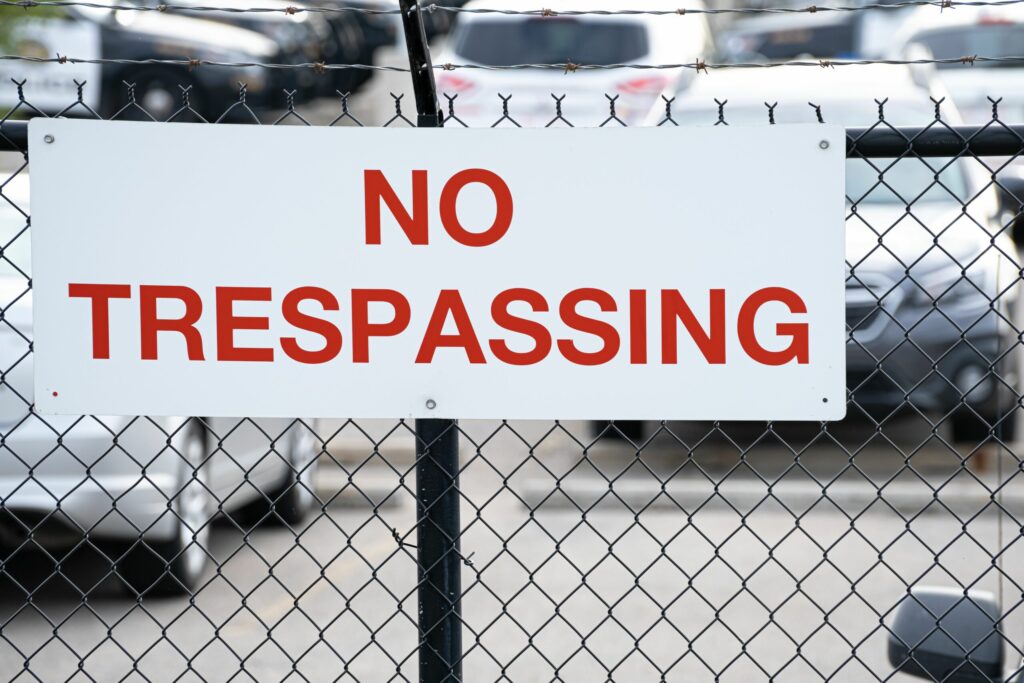If you have been charged with trespassing in South Carolina, it’s essential to understand what you may face as punishment. The penalties can vary greatly depending on the circumstances, but in general, the three main categories of trespassing are as follows;
Trespassing on private property – any personal property where someone is there without consent could lead to trespassing charges: houses, land, commercial buildings, and more.
Trespassing on posted or enclosed/fenced land with posted signs warning of prohibited entry – this could be hunting land or any land that is posted with “no trespassing” or other signs.
Trespassing on public property – could be schools, churches, parks, or other public property.
According to South Carolina law, a trespasser is “a person who enters or remains on the land of another without permission or without legal privilege.” The regulations also stipulate that a “possessor of land” can include the owner, the lessee, or other lawful occupant of the property.
What Should I Do If I’ve Been Charged With Trespassing?
Trespassing isn’t taken lightly, and you should act with urgency if you’re faced with trespassing charges.
The first step is to find a trusted and experienced attorney that you can rely on. Their experience can help you understand the situation and discover your legal options.
With their help, you can gather the evidence necessary to support your defense against the charges. Evidence can be photographs, statements from witnesses, or any documentation you may have received granting you access to the property in question.
Promptly and without fail, attend all court hearings. It may seem that the charges are insignificant or that you will be able to avoid penalties. Regardless of the situation, your persistent effort to attend all court hearings and promptly return communication will exemplify your willingness to respect the law.
Do not discuss the details of the case with anyone other than your attorney. What you say to others may be used against you, so remember to only discuss the details with your attorney before and during any court proceedings.
Is There Any Defense for Trespassing?
There are a few ways in which you can effectively defend trespassing.
First, you have proof of the permission granted to enter the property from the owner/lessee. Suppose you communicated with the property owner to discuss the details of your entering the property; they gave you permission via email/text or otherwise, and then you were charged with trespassing. The documentation of the conversation permitting you to enter could be all you need to have the charges dropped successfully.
Lack of intent – a crucial part of trespassing charges is that the defendant actively or knowingly trespassed. If you can provide sufficient evidence showing that you were not willingly or knowingly trespassing, this can be a viable defense.
Necessity – if there was a necessary reason for you to be on the property in question, this can be another effective defense. For example, suppose you were on the property as a form of escape from harm to yourself or others. In that case, you may be able to provide sufficient evidence that your being on the property temporarily was necessary.
Signage – if you are on property where there are “no trespassing” signs, and they aren’t clearly visible or marked, you may be able to challenge the trespassing charges. Land or property should be clearly and consistently marked; if this isn’t the case, you may be able to avoid charges.
Is Trespassing a Misdemeanor?
Trespassing in South Carolina is considered a misdemeanor and can lead to fines of up to $200 and up to 30 days in jail for the first offense. Generally speaking, for the first offense, you would be facing one or the other, but not both jail time and fines.
It’s important to note that the penalties can increase if you are charged with trespassing multiple times. For example, a second or third offense can lead to more significant fines of up to $1,000 and up to six months in jail. If you are a habitual offender, the courts may penalize you with both jail time and fines.
The other important aspect of trespassing is that the charges will stay on your record. With a misdemeanor on your record, it can lead to issues in the future with employment, being eligible for loans, eligibility for renting a home, and more.
If you have been charged with trespassing, you should immediately take the charges seriously and seek experienced legal help.
Tireless Advocacy When You Need it the Most
Our legal team never settles for what is easy or most attainable. With a thriving desire to learn more and continue to better ourselves, we continuously seek further training and education to perfect our skills to help our clients. We have vast experience in personal injury, criminal defense, negligence, and more.
Carl is not only a member of the South Carolina State Bar but was also the president of it in 2010. His knowledge, patience, and compassion have allowed him to help educate his peers throughout the state and beyond.
Our approach is quality over quantity. We will treat each client with the same compassion, regardless of the gravity of their case. Although trespassing charges may seem like a minor inconvenience in your life, they should be taken seriously by experienced professionals so as not to hinder your life for years to come.
Contact our office today at (803) 219-8870 to learn more. We offer a free initial case evaluation to our clients. This consultation allows us to learn more about your situation and help you answer your questions.
We look forward to serving you.












